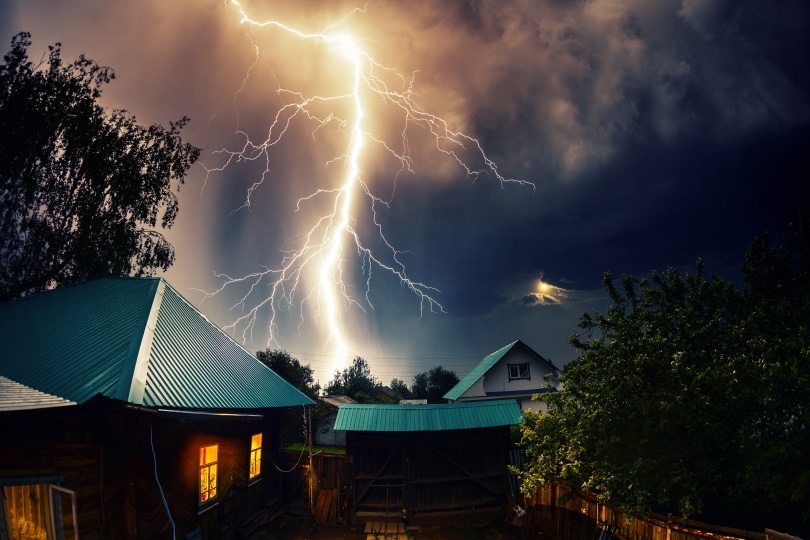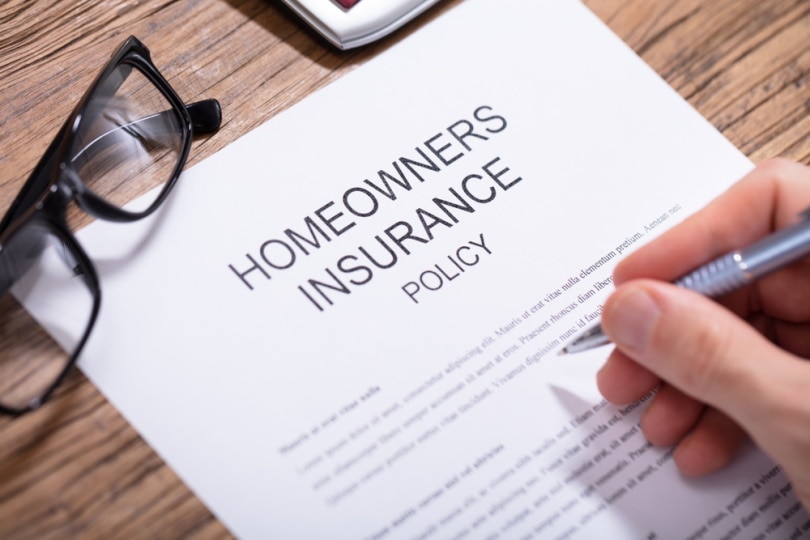Does Homeowners Insurance Cover Lightning Strikes? Coverage & Factors
-
Brooke Bundy
- Last updated:

Thunderstorms can cause a variety of damages to life and property. Lightning strikes, in particular, can start house fires or create electrical surges which can fry outlets and connected appliances. Typically, your homeowner’s insurance will cover damage caused by a lightning storm, but only if you’re able to prove that’s why it occurred. Even so, you’ll need to assess how much it’ll cost to repair the damage to see if it’s worth getting the insurance company involved since that’ll likely raise your premium.
What Homeowner’s Insurance Covers
Your homeowner’s insurance is supposed to cover most natural disasters, mechanical malfunctions, and human errors made by people who don’t live at your home. For example, your policy may help cover expenses if a stranger trips and falls up your stairs, but they won’t pay you if your daughter hurts her ankle. They also might not pay for it if the insurance adjuster determines the cause was preventable or due to neglect, such as if the stairs were rotten and fell through.
Since lightning is a natural disaster that wasn’t caused by a member of your household, most times you’ll have at least some coverage if your home was hit. Some examples of when your policy might help you after a lightning strike include:

Fire
A lightning bolt hitting your property may result in a fire, especially if the ground is dry. Typically, your homeowner’s insurance pays for damages to your house, as well as a hotel stay if you need to live somewhere else while your home is being repaired. Even if firefighters were able to put out the fire, your home might still have damage—even mold from the firefighting techniques that prevented further damage to the structure. Your policy should cover most of these issues as well.
Power Surge
If your laptop was plugged in charging during the lightning storm but was zapped by a power surge, your policy might give you money to replace it. Most homeowners’ insurance policies will pay you cash for any electronic items lost, but there may be some discrepancy in the item’s value. The best way to protect your electronic devices is to unplug them if you know a storm is coming or immediately following the first crack of thunder. However, your insurance policy should be able to help to some degree if disaster strikes.
Fallen Trees
If lightning splits a tree and it falls to the ground, your homeowner’s insurance policy might pay for it to be removed. Additionally, it should pay for any damage the fallen tree caused to your home or fence, as long as you can prove it. If your tree falls on your neighbor’s property, your homeowner’s insurance policy may pay to have your neighbor’s yard repaired as well. In general, your homeowner’s insurance covers any accidental damage to a neighbor’s property as long as it was caused by nature or a mistake made by someone who lives in your house.

What Homeowners Insurance Won’t Fix
Homeowners insurance doesn’t cover all natural disasters. For example, flood and hurricane damage is typically not covered because insurance companies require separate policies for those incidents.
Most lightning accidents are the result of a natural disaster that can be covered by your homeowner’s insurance, but you’ll need documented evidence. You should take pictures of the damage following the storm as soon as it’s safe to do so and call your insurance company to file a claim as soon as you can.
You also want to consider your deductible to see if it is even worth it. If a tree fell in your yard, but it’s easily removable, you might want to think about paying for it yourself if it’s going to significantly raise the cost of your premium to file a claim.
Conclusion
During the storm, your main priority should be keeping you and your family safe. You may not always have time to unplug all the electronics before the lightning strikes, and not all lightning-related disasters are even preventable, such as fallen trees or fires. Having a good homeowners insurance policy in place should help you pay for these events to your property and will even cover any of your trees that hit your neighbor’s house during the storm. Just be sure to take lots of pictures of the evidence and file the claim as soon as you safely can.
- https://www.mybanktracker.com/insurance/faq/home-insurance-damage-neighbors-property-320568
- https://www.valuepenguin.com/homeowners-insurance/what-is-hurricane-insurance
- https://www.progressive.com/answers/power-surges/
- https://www.amfam.com/resources/articles/understanding-insurance/does-homeowners-insurance-cover-lightning
Featured Image Credit: Dudarev Mikhail, Shutterstock
Contents

